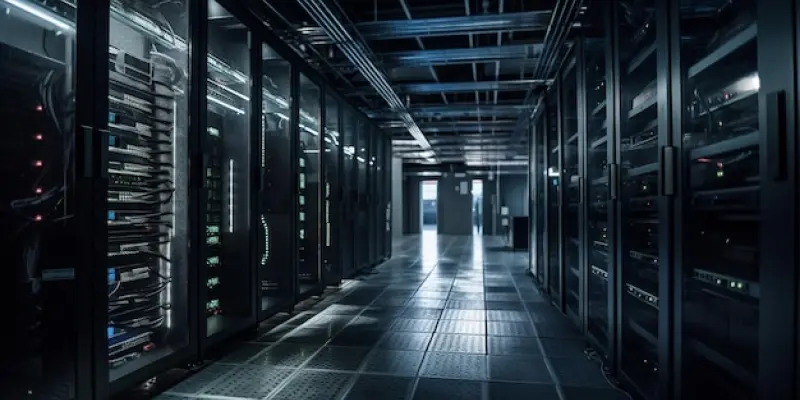The world of technology and sustainability is witnessing a fascinating convergence through the advent of an innovative approach aimed at transforming traditional data centers into eco-friendly bio-circular hubs. A groundbreaking initiative by the French data center operator, Data4, is demonstrating how waste heat from data centers can be effectively harnessed to cultivate algae. This process not only offers a promising avenue for CO2 capture but also facilitates the creation of biofuels, animal feed, and even dietary supplements for humans. Set against the backdrop of growing ecological concerns and energy challenges, this transformative project paints a new picture of data centers as engines for sustainable resource generation.
Harnessing Heat and Enhancing Sustainability
Innovative Use of Waste Heat in Algae Cultivation
Data centers globally consume massive amounts of energy and disperse significant heat, posing operational and environmental challenges. Data4’s initiative addresses this through a proof-of-concept module installed on the rooftop of its Marcoussis campus. By leveraging the otherwise wasted heat from the data center, this module enables the growth of microalgae, chosen for its exceptional photosynthetic capacity and ability to absorb CO2 with an efficiency 20 times greater than trees over an equivalent area. Integrating this algae system into data centers creates a closed-loop energy cycle, where expelled heat and water from cooling processes are repurposed to stimulate algae photosynthesis. This not only mitigates overheating risks but also sustains a vital resource that captures significant CO2 quantities annually.
This symbiotic relationship between data centers and algae cultivation is further enhanced by introducing CO2 from industrial processes, boosting photosynthetic performance. The initiative’s economic and ecological implications are substantial, as it aims to capture up to 13 tons of CO2 per data center annually. The blueprint also envisions expanding algae production to the walls of data centers, potentially increasing CO2 capture to 36 kg daily. With a rigorous eye on scalability, Data4 presents a revolutionary method to reclaim and reuse energy, embodying a step forward in renewable integration and ecological responsibility.
Economic Impacts and Employment Opportunities
A lesser-discussed yet crucial aspect of Data4’s initiative is its potential economic impact, particularly in terms of local employment. As the project seeks to harness the untapped 18 TWh of energy wasted within data centers, it simultaneously generates employment opportunities conducive to local economies. By pioneering a new mode of industrial symbiosis, the system necessitates skilled labor for maintenance and operation, thus driving job creation within the technology and agricultural sectors. Training programs aligned with algae-based technologies can further uplift the workforce through skill enhancement, providing career pathways aligned with sustainability goals.
The economic allure is coupled with a commitment to fostering partnerships with local councils and organizations, such as Conseil Départemental de l’Essonne, ensuring community involvement and support. Data4’s collaboration with Blue Planet Ecosystems underscores its resolve to generate sustainable resources, ultimately creating a ripple effect that promises economic resilience and growth. By transforming data centers into productive units, these endeavors illustrate a forward-thinking approach to sustainable tech development, fostering a harmonious blend of innovation and ecological consciousness.
Towards a Sustainable Future
Ecosystem Integration and Environmental Strategy
The potential of integrating algae cultivation within data centers marks a visionary step towards environmental sustainability, offering a replicable model for other industries. By focusing on ecological renewal and economic feasibility, Data4’s approach aligns with wider global efforts to tackle climate change and promote circular economies. The project’s collaboration with Fondation de l’Université Paris-Saclay exemplifies an interdisciplinary blend of expertise and innovation, propelling algae cultivation as a strategic asset in climate action. Looking beyond immediate benefits, this initiative suggests a paradigm shift in how future data centers could operate as multifunctional units, balancing energy consumption with resource regeneration. By connecting technology, science, and practical ecology, such projects enrich the narrative around renewables and their applicable integration into industrial ecosystems. The success of Data4’s venture may very well serve as a cornerstone for future similar implementations globally, shaping the discourse surrounding sustainable data management.
Lessons and Future Considerations
The intersection of technology and sustainability is reaching new heights as innovative methods reshape traditional data centers into eco-friendly bio-circular hubs. This transformation is spearheaded by the French data center operator, Data4, which is showcasing a unique way to utilize waste heat from data centers. The waste heat is used to cultivate algae, presenting a promising solution for CO2 capture while also paving the path for producing biofuels, animal feed, and dietary supplements for humans. In the face of escalating environmental concerns and energy efficiency issues, this groundbreaking project reimagines data centers as vital contributors to sustainable resource development. By tapping into waste heat for algae cultivation, Data4 is setting a precedent for using data centers as more than mere storage sites, turning them into engines for eco-friendly innovation and sustainability. This initiative suggests that data centers may hold the key to future resource generation within a green framework.

